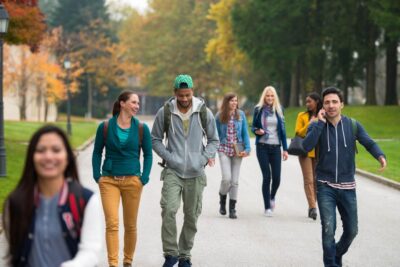What student success leaders got wrong, and what they discovered instead
November 19, 2018
Back when I was in college, I naively believed that students usually became “stop-outs”—withdrawing enrollment from school temporarily—because they couldn’t keep up with the academic work.
It took seeing the impact that mental health and family crises could have on my peers, and then my own life, to change my thinking. After seeing those who stopped out go on to win research awards and academic accolades after they returned to school, I had to admit how wrong I had been.
This realization is one of the things that inspired me to become a student success researcher. But I’m certainly not the only person in education who has had major misconceptions about student success. Even prominent student success leaders can make incorrect assumptions about the causes of student challenges and the most likely solutions.
In October, 10 members of the Student Success Collaborative took the stage to present the second annual ConnectED Stories as part of EAB’s national student success summit. What struck me about their stories was that so many involved a misunderstanding that they confronted, dispelled, and used to drive positive change. After all, isn’t that the point of an education: To let go of what you once thought you knew and arrive at a new perspective?
Here are just a few of my favorites.
Dr. David Keel, Rappahannock Community College: “Second Chances“
The first day that Dr. Dave Keel stepped foot into the local correctional facility, his incarcerated students objected to one of the placement tests he was there to proctor, claiming it was the wrong one. The officers at the security checkpoint warned him to be on the lookout for manipulation, so he assumed the students were lying to get out of taking another test. But he was wrong—he discovered later that he had in fact administered the wrong test.
And after that initial class meeting, Dave’s students at Haynesville Correctional Center continued to dismantle the assumptions he had about prison education and incarcerated students. If anything, he found that they are more dedicated to their studies than the students he instructed on a traditional campus.
Today, Dave is a passionate advocate for prison education and Second Chance Pell. Dave testifies to the transformative effect prison education has on its students, their prison community, and their families back at home.
Lisa Jackson, Florida State University: “A Weekend of Our Own“
Young adults aging out of the foster care system face some of the steepest odds to college degree attainment: Only 3 percent will graduate with a degree. But Lisa Jackson was certain that with the right support they could beat the odds. She helped launch the Unconquered Scholars Program at Florida State University to provide resources, a community, and counseling support to former foster care youth and homeless students.
What Lisa didn’t realize was how emotionally draining Parents’ Weekend was for her students to endure. During those two days, they saw constant reminders of the happy homelife they didn’t have. When she noticed the corresponding dip in their academic performance and social functioning, Lisa started a new tradition: an annual trip away from campus, during Parents’ Weekend, for Unconquered Scholars. For the past two years, it’s been a quintessential “family vacation” at Disney World.
It turns out one of the best things we can do to support these students is make space for them to let their guard down, bond with people who understand them, and just be themselves. Today, 85% of Unconquered Scholars students graduate within four years. This statistically vulnerable population now outperforms the rest of campus.
Dr. Jeannie Brown Leonard, George Mason University, and Dr. Steven Sachs, Northern Virginia Community College: “Teaming Up for Transfer“
Drs. Jeannie Brown Leonard and Steven Sachs tell a tale of two schools. Even though over 4,600 students transferred this past year from NOVA Community College to George Mason University, their paths to transfer were riddled with wasted credits and unmet prerequisites that extended their time and cost to degree.
Together, Jeannie and Steve helped launch the ADVANCE Pathways Initiative to smooth the journey to graduation for transfer students. One of the first steps was getting faculty at both schools to see eye-to-eye on program requirements. Through a series of faculty summits, deans and professors questioned the very basis of their curricula—no assumptions went uninterrogated.
Many four-year faculty realized they were mistaken in believing community college instruction to be any less rigorous than their own courses. Once Mason faculty got to know their peers at NOVA, they recognized that they are accomplished scholars and dedicated teachers who care about their students. They start to arrive at answers for what courses should cover, not based on faculty preferences, but on what students need to be learning.
Dr. Paul Spradley, Robert Morris University: “Sweet Motivation“
When an otherwise stellar student came into his office with falling grades, Dr. Paul Spradley from Robert Morris University began to investigate the reasons for the student’s loss of motivation. He discovered that, in many ways, the student’s struggles reflected his own experiences growing up as a young African American man both buoyed and burdened by his attempts to make his community proud.
While Paul had always attributed his own confidence to the fact that he had the support of a village, seeing this student buckle under the weight of disappointing his mother helped him realized that a community’s support can feel like pressure too.
So Paul went to work. He found ways to help the student cultivate an inner sense of motivation and accomplishment from achievable daily goals, like completing push-ups and journaling. And perhaps most importantly, Paul helped the student find the right language to communicate his mental health diagnosis with his family.
Interested in watching more transformative talks? Check out more ConnectED Stories here:
Richie Ince from Pueblo Community College discusses his work helping stop-outs return to school and cross the finish line.
Dr. Laurie Fladd from Achieving the Dream (formerly Trident Technical College)shares how she drew upon her two decades of experience as a faculty member to win over a curmudgeonly skeptic professor.
John Hamblin from Mt. Hood Community College tells how he uses the power of personal stories to transform his college’s first-year experience.
Jean Peden Christodoulou from Hofstra University recounts the series of hilarious misunderstandings she’s had with faculty as a student affairs administrator and how they’ve helped her become a cultural translator between the factions of higher ed.
Dr. Vincent Windrow from Middle Tennessee State University explains that part of empowering first-generation students is demonstrating the choices they have today lead to different opportunities tomorrow, options that he was only vaguely aware of when he was in college as a first-gen student.
More Blogs

How to navigate policy challenges and show support for your trans students

Our LGBTQ students’ lives and wellbeing are at risk—here are 5 things campus leaders can do to help
